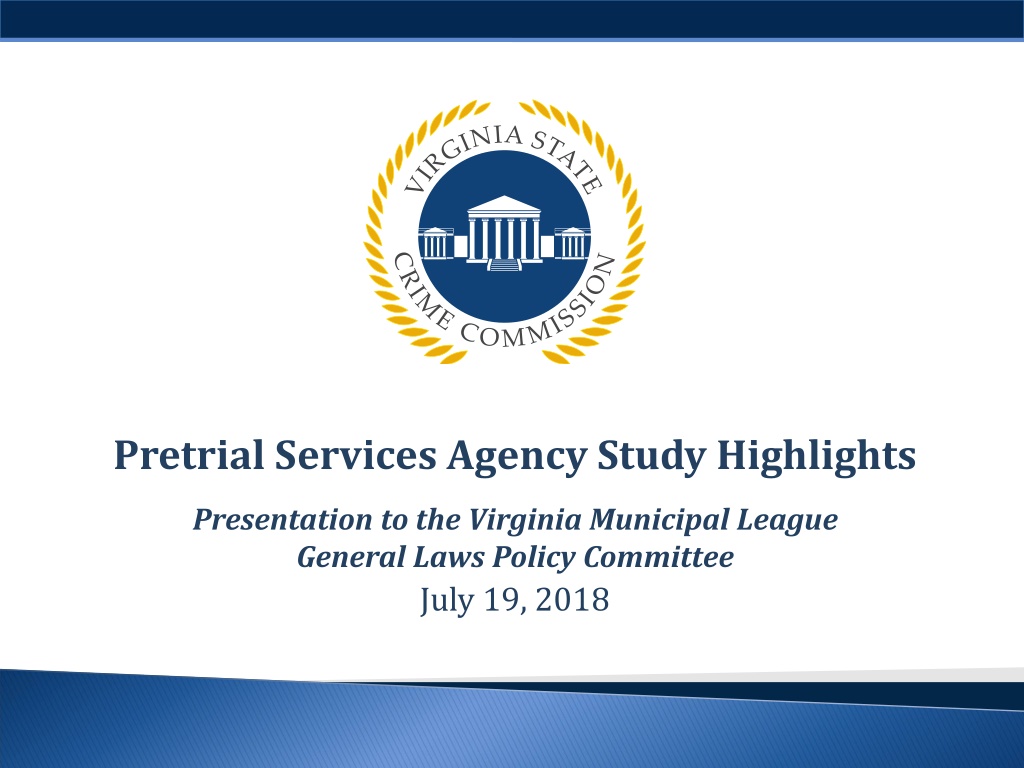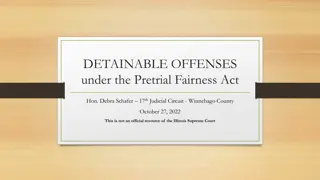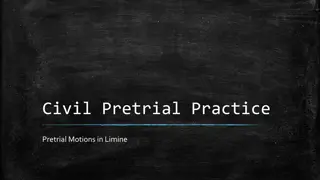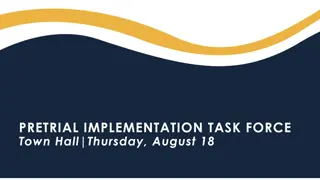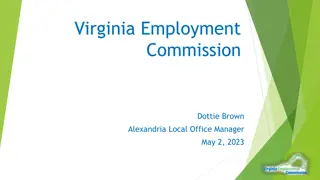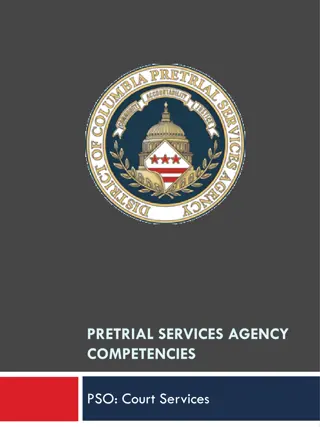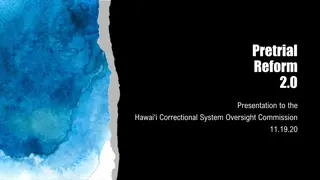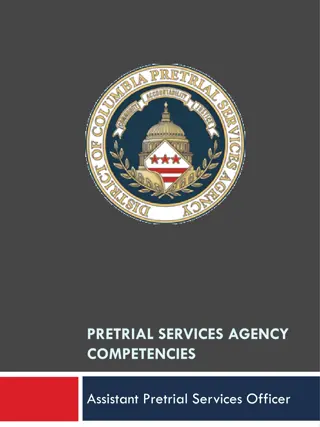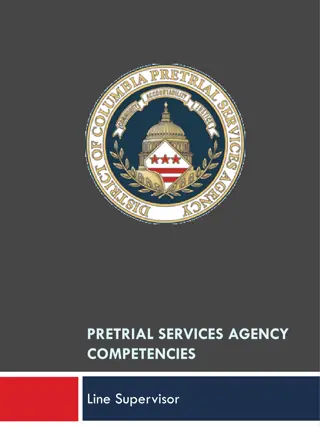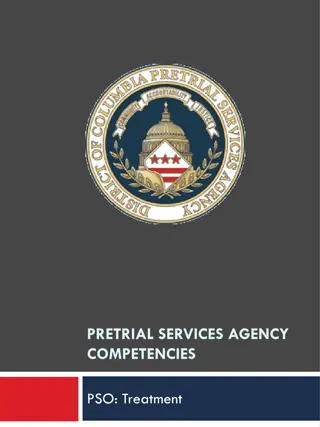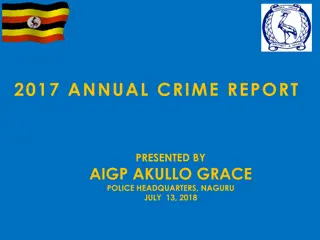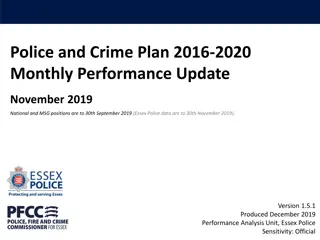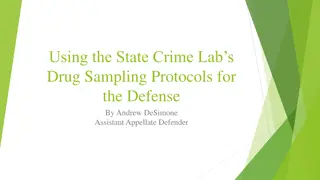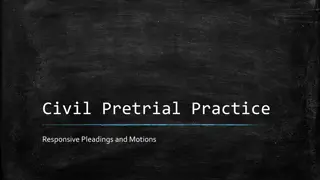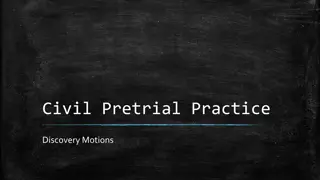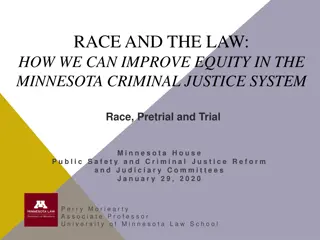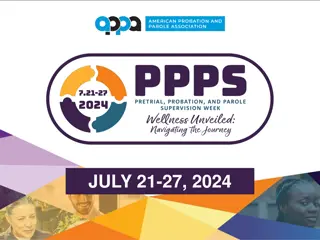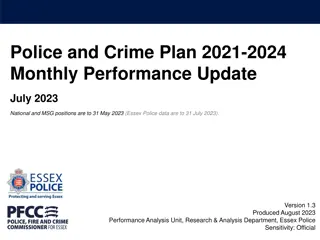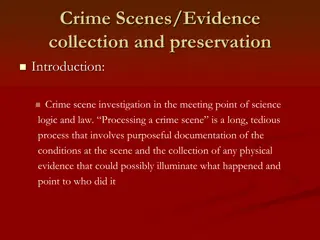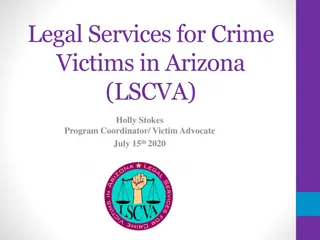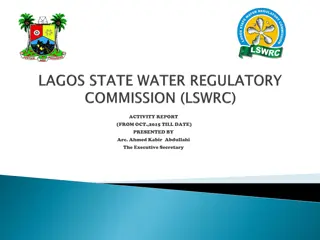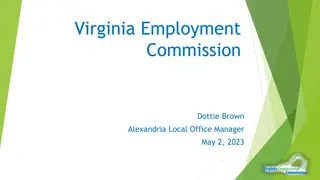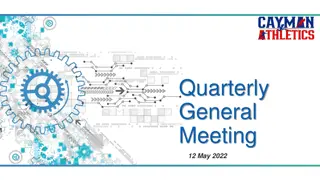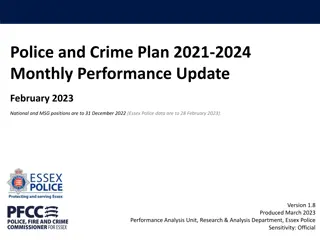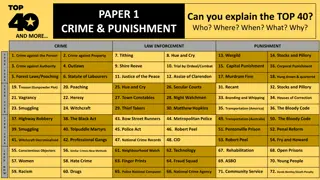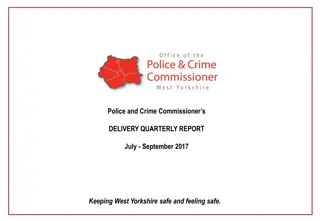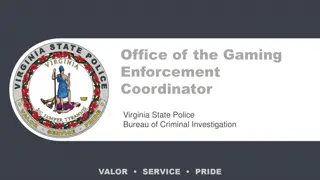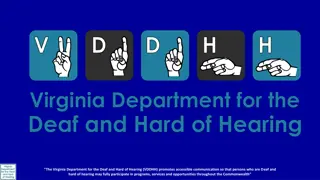Virginia State Crime Commission Pretrial Services Study Highlights
The Virginia State Crime Commission has conducted a comprehensive study on pretrial services agencies, focusing on the statutory mission and the pretrial process. The study examined the use of pretrial services supervision for defendants, indigent defendant placement, fees associated with supervision, and jurisdictional differences. Staff activities included literature review, stakeholder meetings, surveys, and court observations. The study did not delve into monetary bail practices.
Download Presentation

Please find below an Image/Link to download the presentation.
The content on the website is provided AS IS for your information and personal use only. It may not be sold, licensed, or shared on other websites without obtaining consent from the author. Download presentation by click this link. If you encounter any issues during the download, it is possible that the publisher has removed the file from their server.
E N D
Presentation Transcript
VIRGINIASTATE CRIMECOMMISSION Pretrial Services Agency Study Highlights Presentation to the Virginia Municipal League General Laws Policy Committee July 19, 2018 VIRGINIA STATE CRIME COMMISSION
VIRGINIASTATE CRIMECOMMISSION Overview Background Summary of Findings Recommendations Current Status 2 VIRGINIA STATE CRIME COMMISSION
VIRGINIASTATE CRIMECOMMISSION Background The Crime Commission has been studying pretrial services agencies for the past 2 years. House Bills 774 and 776 (2016 Session) were referred to the Crime Commission for review. Members approved a comprehensive study on pretrial services agencies. In 2018, members expanded the scope of the study to include a review of the pretrial process the time period prior to a defendant s criminal trial. 3 VIRGINIA STATE CRIME COMMISSION
VIRGINIASTATE CRIMECOMMISSION Background Members requested staff to examine: Statutory authority governing pretrial services agencies; Whether pretrial services agencies are being overused in supervising defendants for low-level offenses; Use of secured bonds in conjunction with pretrial services supervision; Placement of indigent defendants on pretrial services supervision; Fees associated with pretrial services supervision; and, Whether a difference exists between jurisdictions with and without pretrial services agencies. 4 VIRGINIA STATE CRIME COMMISSION
VIRGINIASTATE CRIMECOMMISSION Background Staff completed the following activities: Collected relevant literature and data; Reviewed pre-trial statutes in Virginia; Examined pre-trial systems in other states; Conducted informal surveys of judges, regional jails, sheriffs, prosecutors, and defense counsel; Surveyed pretrial services agencies; Met with stakeholders; Attended local, state, and national trainings; and, Conducted field visits and court observations. 5 VIRGINIA STATE CRIME COMMISSION
VIRGINIASTATE CRIMECOMMISSION Background Staff focused on the statutory mission of pretrial services agencies and the process by which defendants are investigated, assessed, and placed on pretrial services supervision. Staff did not examine specific elements of supervision activities or practices once a defendant had been placed on pretrial services supervision. The study did not focus on monetary bail. 6 VIRGINIA STATE CRIME COMMISSION
VIRGINIASTATE CRIMECOMMISSION Background What is a pretrial services agency? A locality-based agency governed by the Pretrial Services Act that serves two primary roles: o Provide information to judicial officers to assist with bail determinations; and, o Supervise defendants to ensure compliance with bond conditions set by judicial officers. As of January 2018, there were 33 agencies serving 100 counties and cities across the Commonwealth. 7 VIRGINIA STATE CRIME COMMISSION
VIRGINIASTATE CRIMECOMMISSION Background Source: Virginia Department of Criminal Justice Services, January 2018. 8 VIRGINIA STATE CRIME COMMISSION
VIRGINIASTATE CRIMECOMMISSION Background Who administers pretrial services agencies? By Code, both localities and the Virginia Department of Criminal Justice Services (DCJS) have a role in the administration of these agencies. Localities: Choose whether to establish a pretrial services agency; May cease providing such services by notifying DCJS; Employ pretrial services personnel; and, May provide local funding to pretrial services agencies. 9 VIRGINIA STATE CRIME COMMISSION
VIRGINIASTATE CRIMECOMMISSION Background Who administers pretrial services agencies? DCJS: Reviews and approves plans submitted by localities to establish a pretrial services agency; Prescribes statewide minimum standards for pretrial services agencies; Monitors pretrial agency compliance with approved plans and standards; and, Provides grant funding to localities for the administration of these agencies ($10.1 million in FY17). 10 VIRGINIA STATE CRIME COMMISSION
VIRGINIASTATE CRIMECOMMISSION Summary of Findings Overall, broad support existed amongst many stakeholders for the use of pretrial services agencies. Staff identified multiple concerns relating to the administration of pretrial services agencies that needed to be addressed. 11 VIRGINIA STATE CRIME COMMISSION
VIRGINIASTATE CRIMECOMMISSION Summary of Findings Pretrial services agencies are locality-based and therefore practices and resources vary greatly. o The overall performance of pretrial services agencies across the Commonwealth is difficult to assess. o First appearance procedures vary significantly by locality. Anecdotal evidence exists that some agencies are high functioning while others are not. o Virginia Code requires DCJS to establish standards and monitor the compliance of agencies; however, no formal auditing or policy review process exists to measure compliance with these standards. 12 VIRGINIA STATE CRIME COMMISSION
VIRGINIASTATE CRIMECOMMISSION Summary of Findings A high number of defendants are placed directly on pretrial services supervision by judicial officers without a pretrial investigation. o Magistrates generally do not receive any information from pretrial services agencies. o Information provided to judges varies by locality. A high number of investigations are conducted that do not result in pretrial services placements. o Allocation of resources vary by agency due to factors such as overall funding, staffing, and local practices. 13 VIRGINIA STATE CRIME COMMISSION
VIRGINIASTATE CRIMECOMMISSION Summary of Findings There are no regular or consistent reviews of pre-trial jail populations by pretrial services agencies. o DCJS minimum standards require each pretrial services agency to develop policies and procedures from the initial appearance through adjudication for defendants who remain in jail. Based upon survey responses and field visits, the frequency of the reviews of jail populations vary greatly by agency. 14 VIRGINIA STATE CRIME COMMISSION
VIRGINIASTATE CRIMECOMMISSION Summary of Findings A revised risk assessment and new supervision matrix were implemented statewide in September 2017. o Provides more objective risk scoring factors. o History of drug abuse remains subjective. o No guidance exists for the use of UNCOPE as a substance use screening tool, which may impact the defendant s risk level on the VPRAI-R. o Affords for the use of differential supervision. Due to the timing of implementation, staff could not fully assess the effectiveness and impact of these significant statewide changes. 15 VIRGINIA STATE CRIME COMMISSION
VIRGINIASTATE CRIMECOMMISSION Summary of Findings DCJS does not use a funding formula to determine disbursement amounts of grant funds to pretrial services agencies. o Multiple pretrial services agencies have expressed frustration that funding is not allocated based upon needs. o Local agencies consistently noted that staffing issues greatly impact their ability to conduct investigations and manage caseloads. 16 VIRGINIA STATE CRIME COMMISSION
VIRGINIASTATE CRIMECOMMISSION Summary of Findings The PTCC case management system is antiquated. o Certain data is not readily accessible to individual agencies without the assistance of DCJS. During staff analysis of statewide pretrial services data, several concerns were identified: o Numerous fields in PTCC are not completed. o Definitions are not consistently applied by agencies. o Regular compliance monitoring does not exist to readily identify and correct data entry errors or omissions, which impacts the integrity of the data. 17 VIRGINIA STATE CRIME COMMISSION
VIRGINIASTATE CRIMECOMMISSION Summary of Findings Training was a concern of many stakeholders. Staff attended various DCJS trainings and had concerns about the uniformity of the instruction provided. Staff surveyed pretrial services agencies during the study and found that comments on the quality of training were mixed; however, there was a general agreement that the quality of training has improved in recent years. 18 VIRGINIA STATE CRIME COMMISSION
VIRGINIASTATE CRIMECOMMISSION Summary of Findings Recent efforts have been made by DCJS and others to educate stakeholders on the role and purpose of pretrial services agencies, however: o Prior to August 2017, there had not been a pretrial presentation to sitting judges in at least 5 years; o The last pretrial presentation at a Commonwealth s Attorneys statewide conference was in April 2013; and, o There has not been a pretrial presentation at an IDC statewide conference in at least 5 years. 19 VIRGINIA STATE CRIME COMMISSION
VIRGINIASTATE CRIMECOMMISSION Recommendations All recommendations were unanimously endorsed by the Crime Commission at the December 2017 meeting. 20 VIRGINIA STATE CRIME COMMISSION
VIRGINIASTATE CRIMECOMMISSION Recommendations Recommendation #1: Va. Code 19.2-152.7 should be amended to require DCJS to report annually on the status of each pretrial services agency. Status: HB 996 (Delegate Gilbert) and SB 783 (Senator Peake) introduced identical bills during the 2018 Session. Both bills passed the General Assembly as introduced and were signed into law by the Governor. 21 VIRGINIA STATE CRIME COMMISSION
VIRGINIASTATE CRIMECOMMISSION Recommendations Recommendation #2: DCJS should conduct a formal needs assessment of stakeholders to identify the strengths and weaknesses of pretrial services programs. Status: A needs assessment was completed in March 2018. Recommendation #3: DCJS should convene a group of stakeholders to develop specific recommendations to improve pretrial services. Status: The Pretrial Services Stakeholder Group convened in March and will hold its last meeting in September. 22 VIRGINIA STATE CRIME COMMISSION
VIRGINIASTATE CRIMECOMMISSION Recommendations Recommendation #3: The DCJS Stakeholder Group should consider the following issues: Reviewing the findings of the needs assessment; Comparing pre-trial outcomes in jurisdictions with pretrial services agencies and jurisdictions without pretrial services agencies; Providing information to assist with bail determinations at the magistrate level; Implementing or developing a static risk assessment instrument to be used in assisting with bail determinations at the magistrate level; 23 VIRGINIA STATE CRIME COMMISSION
VIRGINIASTATE CRIMECOMMISSION Recommendations Recommendation #3: The DCJS Stakeholder Group should consider the following issues (cont.): Developing strategies to ensure that investigations of all detained defendants who are eligible for pretrial services are completed and information is provided to the courts; Identifying staffing and resource needs of local pretrial services agencies, as well as what is required from DCJS to provide adequate support to those local pretrial services agencies; 24 VIRGINIA STATE CRIME COMMISSION
VIRGINIASTATE CRIMECOMMISSION Recommendations Recommendation #3: The DCJS Stakeholder Group should consider the following issues (cont.): Analyzing the impact of pretrial services agencies on local jail populations; Ascertaining methods to better define and track statewide appearance, public safety, and success rates; Continuing to educate stakeholders on the role, duties, and appropriate uses of pretrial services agencies; 25 VIRGINIA STATE CRIME COMMISSION
VIRGINIASTATE CRIMECOMMISSION Recommendations Recommendation #3: The DCJS Stakeholder Group should consider the following issues (cont.): Determining guidelines for the use of the UNCOPE (substance use screening tool); Establishing uniform vocabulary and definitions for data entry and tracking; and, Any other improvements to pretrial services agencies. 26 VIRGINIA STATE CRIME COMMISSION
VIRGINIASTATE CRIMECOMMISSION Recommendations Recommendation #4: DCJS should monitor the implementation of the VPRAI-R and Praxis over the next year to examine the effectiveness of these instruments and identify any issues or unintended consequences in the application of these tools. Status: Ongoing. Recommendation #5: DCJS should work with localities, pretrial services directors, and any other stakeholders to determine a funding formula for grant disbursements to pretrial services agencies. Status: A meeting is expected to occur August/September. 27 VIRGINIA STATE CRIME COMMISSION
VIRGINIASTATE CRIMECOMMISSION Recommendations Recommendation #6: DCJS should explore options for improving or replacing the case management system used by pretrial services agencies (PTCC). Status: Ongoing. Recommendation #7: DCJS should monitor the use of the case management system (PTCC) by pretrial services agencies to ensure that comprehensive definitions are developed and data is entered. Status: Ongoing. DCJS will report to the Commission on the status of Recommendations #2-7 by Nov. 1, 2018. 28 VIRGINIA STATE CRIME COMMISSION
VIRGINIASTATE CRIMECOMMISSION Current Status Numerous stakeholders are involved in a two-phase project in an attempt to determine whether failure to appear and public safety rates vary across pre-trial release mechanisms. o Phase I: develop a cohort of defendants brought before magistrates in October 2017 that will be tracked until August 31, 2018. o Phase II: track final disposition, failure to appear, and public safety (new arrest) outcomes for this cohort. 29 VIRGINIA STATE CRIME COMMISSION
DCJS providing data for all pretrial services placements in October-November 2017. Also will provide FTA/new arrest data for cross- validation with criminal histories. OES providing E-mag data for all charges brought before magistrates in October 2017 with follow- up data from November 1, 2017 - August 31, 2018. VIRGINIA STATE CRIME COMMISSION VIRGINIA CRIMINAL SENTENCING COMMISSION Compensation Board data to validate length of stay OES CMS data to track dispositions & FTAs; Provides summons and direct indictment charges that E- mag does not capture. VSP criminal histories for October 2017 cohort to track FTAs/new arrests VIRGINIA STATE CRIME COMMISSION
VIRGINIASTATE CRIMECOMMISSION Discussion Kristen Howard, Executive Director khoward@vscc.virginia.gov 804-225-4534 vscc.virginia.gov 31 VIRGINIA STATE CRIME COMMISSION
